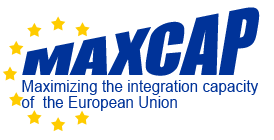Antoaneta Dimitrova, as one of MAXCAP’s project coordinators, attended an open access training on 12 November 2013 in Brussels, organized by the Flash IT project of the FP7 of the European Commission. There were presentations by Daniel Spichtinger, Open Access officer at the European Commission, Viktoria Tsoukala, from the National Documentation Centre in Athens, Greece and Professor Alma Swan, director of several open access advocacy groups and NGOs and a specialist in Open Access.
Some of the key recommendations all colleagues should bear in mind so that we can comply with open access requirements were summarized by Viktoria Tsoukala. To comply with FP7 open access requirements, scholars need to show that they have made their best effort to make their work open access. This can happen via two routes, the so called Green route and the Gold Route. The Green route involves so called self-archiving, whereby ‘the author archives an electronic copy of a peer-reviewed publication (author’s final copy or publisher copy) in an institutional or subject repository at the time of publication, after which it is freely available to everybody under specific license. A repository is an online database operating under specific technical standards that allows the institution to manage, preserve, disseminate, showcase its scientific output.’ (Tsoukala, 2013).
If there is no institutional repository, depositing with OpenAIRE is recommended (see http://www.openaire.eu/en/support/helpdesk ).
The Gold Route involves paying for making one’s article open access, which are costs eligible under the FP 7 programme for the duration of the project and also under the forthcoming HORIZON2020 programme. Authors should consider doing this also for MAXCAP, provided that the costs charged by specific journals are not so exorbitant as to eat up all the dissemination budget.
A summary of digital resources was provided:
- www.openaire.eu (the European repository for FP7 and Horizon 2020 research)
- Open access publisher policies, Sherpa/Romeo (http://www.sherpa.ac.uk/romeo )
- Creative Commons Licenses (www.creativecommons.org)
- Open access funder policies
- (Sherpa/Juliet-http://www.sherpa.ac.uk/j)
- Open access institutional policies (http://roarmap.eprints.org/)
- Open access repositories (subject-based and institutional)- OpenDoar http://www.opendoar.org/
- Directory of open access journals(www.doaj.org)
- Open access monographs registry (www.doabooks.org )
- OAPEN Foundation (www.oapen.org)
- Open access data repositories (registry of research data repositories http://www.re3data.org/
- Authors TCA Addendum (for licensing publishers)
- (SPARC Addendum- http://www.sparc.arl.org/resources/authors/addendum)
- Surf copyright toolbox http://copyrighttoolbox.surf.nl/copyrighttoolbox/
- Overall on open access and policy guidelines: UNESCO guidelines by Alma Swan
- Guidelines for policy implementation for RPOs and RFOs : www.medoanet.eu
The most important conclusions of the training were:
Putting one’s final pre-publication copy in a university depository is an easy and open access friendly, green route of complying with requirements for FP7;
Costs for making a project related publication open access are eligible to be declared if it happens during the duration of the project.
Please find the presentations by Daniel Spichtinger, Viktoria Tsoukala and Alma Swan here:

